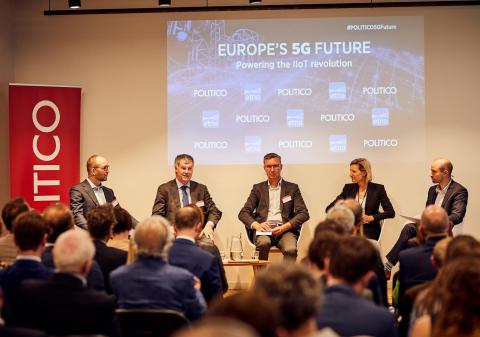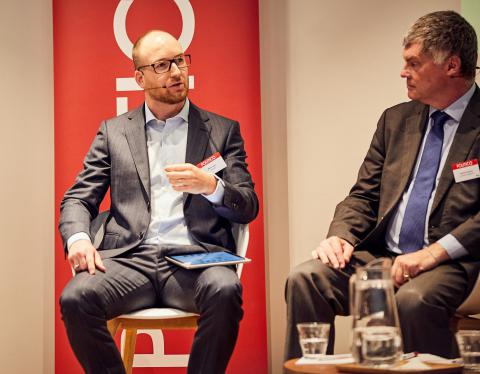Not evolution but revolution: European industry’s 5G future
5 September 2019

5G - the fifth generation of mobile communications - is set to deliver a quantum leap in the volume, speed and security of data transfer. This will mean much more than just faster streaming of films on your smartphone. As the technology backbone for the future (Industrial) Internet of Things (IIoT), 5G infrastructure will enable digital transformation across Europe’s economy and society in areas as diverse as energy, healthcare and mobility. Kicking off the Brussels debate on this hot topic at the start of a new legislative period, the Politico event ‘Europe’s 5G Future: Powering the IIoT revolution’ took a closer look at the opportunities on offer - and the role the EU policy framework has to play.
Hosted by the European Telecommunications Network Operators’ Association ETNO, the event sent a clear message: 5G is not an evolution, but a revolution. As ETNO Director General Lise Fuhr stated in her opening remarks: “5G is a game changer for all of us - for Europe’s industry, its administration and our citizens.” This was echoed throughout the panel debate, with Politico tech reporter Laurens Cerulus delving deeper into the issues with contributors MEP Angelika Niebler, the European Commission’s Pearse O’Donohue (Director, DG CONNECT), Henri Korpi, Executive Vice President of telecom services provider Elisa, and Orgalim Director General Malte Lohan.
Mr Lohan brought to the table the views of Europe’s technology industries, companies innovating at the crossroads of digital and physical tech to drive digitalisation throughout the economy and society. He underlined the “transformational impact” of 5G for manufacturing, as it can facilitate real-time data analytics through connected sensors integrated across the production chain - translating into greater efficiency and productivity while enabling new data-driven business models. The importance of 5G for industry’s future competitiveness is not lost on policymakers either, with MEP Niebler highlighting it as a central focus area for the new European Parliament.
The revolutionary potential of 5G reaches far beyond the factory floor, however. As the Commission’s Mr O’Donohue pointed out: “5G represents a fundamental shift: by enabling the IoT, it brings in whole new sectors of the economy.” And this can bring benefits to citizens far beyond the typical consumer applications associated with mobile data networks: whether greater resource efficiency through smart manufacturing, enhanced quality of life in smart cities, or lower emissions via smart energy grids.

For Mr Lohan, this is an unmissable opportunity for EU policymakers: “Europe needs to demonstrate in the next five years that we deliver value for citizens - and as a fundamental pillar supporting digitally enabled solutions to society’s biggest challenges, getting it right on 5G will be an important step.”
What is needed to make it happen? The panel agreed that stepping up investment is a top priority. However, as Mr Lohan pointed out: “Investment is not just about money - it’s also about creating trust and confidence in the market and demonstrating the potential of new business models.” He set out three key recommendations from the perspective of Europe’s technology industries: a holistic strategy that connects the dots between the policy areas relevant for investment, a regulatory framework that recognises the differences between B2C and B2B environments, and a strong horizontal approach to cybersecurity.
Overall, panelists struck an optimistic note on the EU’s ability to capitalise on the potential of 5G. Despite pressure from the US and China, Europe’s robust industrial base puts it in a very strong position to carve out competitive advantage. Underlining the dynamism of the EU’s technology ecosystems, Mr Lohan argued that success will not depend on the emergence of a few isolated ‘European champions’ but rather on enabling the speed and innovation these ecosystems need to bring use cases to market. The language of the consumer Internet may be that of the US, concluded ETNO’s Lise Fuhr, but “with 5G and the IoT, industrial and digital applications will have the opportunity to speak European.”
For more on the transformative impact of 5G on the factory floor, check out our Technology at Heart report on an innovative collaboration between SKF, Ericsson and Chalmers University of Technology.
Photos: Politico

LATEST NEWS
Wired for Success: Electrifying Europe's Climate Race
We are proud to renew our partnership with EUS...
